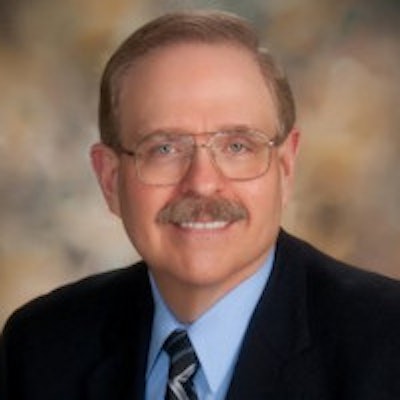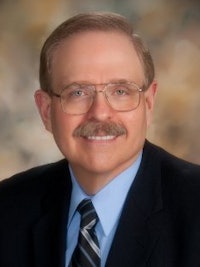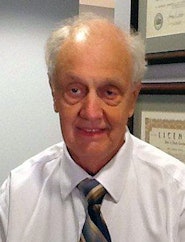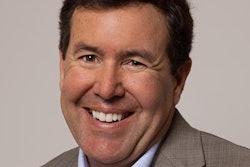
There can be major advantages to working in corporate dentistry, including generous salaries, administrative support, and regular work schedules -- benefits especially tantalizing to new dental graduates saddled with debt. But there can be downsides to working in corporate dentistry, according to one dentist who's been there.
Corporate dental chains -- or more specifically, dental service organizations (DSOs) -- offer relief from the burdens of solo practices, such as being available 24/7 and the daily business aspects of bookkeeping, supplies, and staffing. Corporations also provide marketing, expensive equipment, continuing education courses, and recruitment, and they can negotiate deals with dental labs and third-party payors that solo practitioners cannot begin to match.
 Jerry W. Caudill, DMD.
Jerry W. Caudill, DMD.
But while DSOs offer a broad range of benefits and perks, they have a downside, particularly the loss of independence that dentists in private practice enjoy, according to Jerry W. Caudill, DMD, a consultant to the Academy of General Dentistry (AGD) Corporate Dentistry Task Force. Dr. Caudill is a former national dental director of a 120-office, multistate dental management group and is now a dental insurance consultant and member of the American Association of Dental Consultants.
Dr. Caudill has worked in private practice and corporate dentistry, and the experiences can be very different, highlighting the changing nature of the dental field, he said.
"I think we're seeing the commoditization of dentistry," he told DrBicuspid.com.
Advantages of DSOs
When Dr. Caudill was recruiting for DSOs, he emphasized the worry-free aspects to young dentists.
"I told them, 'All you have to do is come to work and do what you were trained to do and do what you love to do, then go home, spend time with your wife and kids and forget it,' " Dr. Caudill recalled. "That's very appealing. A lot of the new generation wants that, versus paying your dues and starving for a number of years to build a practice and be their own boss. That's the two sides of the coin."
He believes the growth of corporations is partly due to the financial pressures that new graduates and young dentists face.
Graduating dentists often come out of school with $250,000 in debt. "They need to start making money from day one," Dr. Caudill noted. "They really don't have the luxury of starving for a while in this tough economy."
Earlier generations of dentists relied on bank loans or associateships with established practitioners. But the ongoing recession is delaying retirement for many dentists, and bank loans are harder to get.
"It's hard to get hired as an associate in a down economy," Dr. Caudill said. "Dentists are staying in practice longer and sometimes having trouble selling their practice, and there's no financing for buyers."
Some dentists have been forced to self-finance deals to sell their practices to young dentists, he said, but corporations have the money to buy them out easily.
Criticism of DSOs
Some DSOs have been the subject of Congressional investigations of Medicaid fraud, and North Carolina and Texas have passed laws increasing regulatory oversight of them.
A U.S. Senate committee recently released a report that recommended that four corporate-owned chains should be excluded from the Medicaid program for encouraging dentists to perform unnecessary treatments to boost profits.
Dr. Caudill, a former president of AGD's North Carolina chapter, spoke to many dentists who have worked for DSOs when he worked with North Carolina legislators last year on the new law to add regulatory oversight of dental chains.
“Patients have a right to know who is driving the bus, who is really calling the shot regarding their care.”
AGD Corporate Dentistry Task Force
"This was not about keeping chains out, it was to level the playing field and make sure they did it legally," Dr. Caudill noted. "I think the people of North Carolina are better off because you have real licensed doctors in charge rather than bean counters or accountants."
He stressed that not all DSOs are unethical. "There are some good players out there, but there are bad apples, and I've talked to dentists who've worked for them," Dr. Caudill said.
Some DSOs have come into areas and offered sharply lower fees, running small practices out of business, he said.
He recalled a "big player" in Kentucky that targeted a solo practitioner who had opposed the company from coming into the state.
"A doctor stood up at dental meetings saying it was bad for the community and patients," Dr. Caudill recalled. "They came to his area and opened an office right across the road from him and undercut his fees by 25%." The dentist was driven out of business, he said.
While the buying power of DSOs helps them negotiate good prices for equipment and lab services, it can also influence patient treatment, he said.
Some labs have offered different levels of service -- one for chains and one for private practices, according to Dr. Caudill. "You can guess which one gets the more highly trained technicians," he said, adding that this practice is a well-known fact in the dental community.
Other aspects of corporate dentistry involve how often dentists can order supplies. After a slow month, a practice can run out of supplies before the month has ended but can't order again until the next month.
"Doctors say, 'How can I reach the numbers you want without supplies?' Doctors are tempted sometimes to use the wrong color composite if they don't have the right color," Dr. Caudill said. "There's a temptation to rationalize in order to make a living. It's not really going to harm the patient, but it's just not right."
He has heard of business strategies in corporate dentistry that are similar to the findings of the U.S. Senate's investigation regarding unnecessary treatments for Medicaid patients.
"Dentists will put in a stainless steel crown when a simple filling will do because Medicaid pays for it and it can be done relatively quickly," Dr. Caudill said. "I sincerely believe most doctors want to treat Medicaid patients the same as fee-for-service patients and not overtreat them, but some corporations indoctrinate their doctors to overtreat."
Corporate mentality often limits a dentist's ability to take time with patients.
"Some DSOs run patients like cattle though a chute; I've heard patients say they were rushed in and rushed out," Dr. Caudill said. "Some companies put that pressure on dentists and tell them they're only allowed an hour for molar root canals."
DSOs usually have in-house specialists that dentists must use for referrals. "It's one more little piece of control you give up when you work for these groups," he said.
To help dentists who are considering working for DSOs, the AGD will evaluate employment contracts for its members.
Unlike private practices, DSOs need extra profit margins to pay the layers of people beyond the dental team. "There're a lot more mouths to feed," Dr. Caudill pointed out, such as corporate executives and stockholders. "They all have to get their piece of the pie," he noted.
DSOs argue that they reach out to patients in rural or underserved areas, but corporations do demographic studies and traffic surveys to evaluate whether it's worth it to open offices in certain areas, Dr. Caudill said.
"To say they''' go to Podunk, TX, and set up an office to serve needy people is I think disingenuous," he said.
The upside of corporate dentistry
But some dentists who work for DSOs enjoy the advantages. Ronald H. Hsu, DDS, a pediatric dentist, has worked at Gentle Dental in Battle Ground, WA, for several years. Gentle Dental has 21 offices in the Vancouver/Portland, OR, area.
The father of four children, Dr. Hsu told DrBicuspid.com that working 9 to 5 four days a week means he has "minimal practice management headaches" compared with many of his colleagues in private practice, who talk about being stressed.
"If I can spend time with my kids now and make a decent living, why not?" he said.
Perception of corporate dentistry
According to Gary Oyster, DDS, a private practitioner in Raleigh, NC, who is the legislative chair of the North Carolina Dental Society, the bottom line is that DSOs have to operate ethically and keep the priority on patients, not profits.
 Gary Oyster, DDS.
Gary Oyster, DDS.
"If you're going to own something then doggone it, you should be liable if something doesn't go right," Dr. Oyster told DrBicuspid.com. "But they don't want that; they don't want to take the tough stuff with the good stuff and that's the real problem -- the lack of responsibility and liability."
In March, the North Carolina State Board of Dental Examiners and a group of dentists filed lawsuits against DentalWorks, alleging that the dental chain pressured dentists and dental workers to give patients expensive, unnecessary treatments. The suit also claims DentalWorks is illegally practicing dentistry because only dentists licensed in North Carolina can own dental practices in the state. The partnerships are "legal shells" to give the appearance that they are lawfully complying with the state's Dental Practice Act.
"They felt like things were hidden from the board and things were being done that were not above board," Dr. Oyster said of the lawsuit. "The board doesn't have enough staff to check everything, so individual dentists who feel wronged have stepped forward."
In the final analysis, dentists agree that patients should remain the priority, not corporate profits.
"Patients have a right to know who is driving the bus," Dr. Caudill concluded, "who is really calling the shot regarding their care -- the doctor or the corporation."



















